| Srl | Item |
| 1 |
ID:
155770
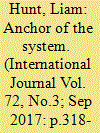

|
|
|
|
|
| Summary/Abstract |
American nuclear diplomacy generally presents a set of explanatory conditions ripe for the political realist: rogue states, an alarmed public, and existential risk create a milieu apt for realpolitik. This case study closely examines the link between the Joint Comprehensive Plan of Action and the theoretical trends in United States foreign policy, specifically with respect to the dictates of neorealism. At the time of writing, the bulk of literature on the Joint Comprehensive Plan of Action and its consequent developments remains lacking in theoretical commentary on how the agreement relates to broader narratives of United States foreign policy. This essay bridges the gap in the literature by drawing a connection between the Iran nuclear deal, neorealism, and liberal institutionalism. The findings suggest that the Joint Comprehensive Plan of Action marks a significant deviation from the predictions of realism, instead acting as an example of liberal institutionalism and potentially signalling a greater shift toward multilateralism in United States foreign policy.
|
|
|
|
|
|
|
|
|
|
|
|
|
|
|
|
| 2 |
ID:
192146
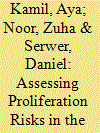

|
|
|
|
|
| Summary/Abstract |
Whether the Iran nuclear deal rises from the ashes or not, the United States and Europe now need to focus on preventing a nuclear arms race in the Middle East. Turkiye and Saudi Arabia are the most likely to respond to Iran’s becoming a nuclear-threshold state. Both have good reasons to think twice before proceeding, but their current leaders have made statements that arouse concern. Egypt might find it hard not to follow in their wake. With Israel and Iran, there would then be a prospect of five rivalrous nuclear powers in close proximity in a volatile region. Avoiding this scenario will require careful analysis of nuclear capabilities in the potential proliferating states; intense diplomacy among the US, Europe and the potential proliferators; and a broader regional-security framework for threat assessment that does not exist today.
|
|
|
|
|
|
|
|
|
|
|
|
|
|
|
|
| 3 |
ID:
155578
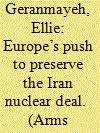

|
|
|
|
|
| Summary/Abstract |
Over the summer, there has been a re-energized push from the EU high representative for foreign affairs, Federica Mogherini, and the E3, that is, France, Germany, and the United Kingdom, urging the Trump administration to stay on board with the Iran nuclear deal, known as the Joint Comprehensive Plan of Action (JCPOA). This is a clear, immediate priority.
|
|
|
|
|
|
|
|
|
|
|
|
|
|
|
|
| 4 |
ID:
164108
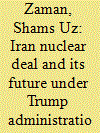

|
|
|
| 5 |
ID:
148020
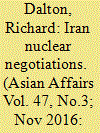

|
|
|
|
|
| Summary/Abstract |
This article, written by the former British Ambassador to Iran, starts with an overview from an insider's perspective of the 15 years of diplomacy leading up to the July 2015 Joint Comprehensive Plan of Action (JCPOA) regarding Iran's Nuclear capabilities. It discusses the merits of the plan and its prospects for the future. It examines the development of international economic engagement, and in particular argues that the western powers need to do far more to deliver an economic quid pro quo for Iran's nuclear concessions: if the situation is not appreciably better soon, it will be impossible for the US and its partners to argue credibly that they are not in breach of the JCPOA. The article concludes with a discussion of Iran's economic and political prospects in the light of the nuclear deal.
|
|
|
|
|
|
|
|
|
|
|
|
|
|
|
|
| 6 |
ID:
184989
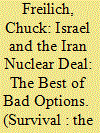

|
|
|
|
|
| Summary/Abstract |
Israel’s national security strategy in many ways has been a historic success. Once a weak, embattled state whose survival was at stake, Israel has become an essentially secure state whose existence is probably no longer in doubt. A nuclear Iran remains the only potentially existential threat, and Hizbullah a severe proximate threat. A simple process of elimination among the options available to Israel shows that a revived nuclear deal is the best of a bad lot. Sanctions, covert sabotage and a military attack are unlikely to yield long-term gains. No one knows if, when or how regime change will occur. A revived deal buys Israel the greatest amount of time and may produce new opportunities if extended. But Israel may eventually have no choice but to launch a military attack, possibly designed to force the international community to take decisive action.
|
|
|
|
|
|
|
|
|
|
|
|
|
|
|
|